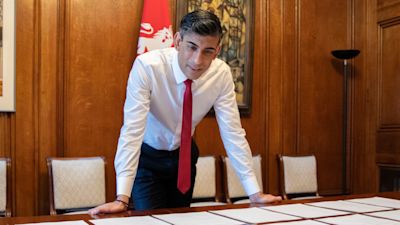Insight
Intervening isn't natural for Rishi Sunak - in the long run he wants to be a traditional Tory

The cost of living crisis couldn't be more real: at the petrol pumps, in the supermarket, on the face of energy bills and as the Bank of England moves to rein in inflation - in the rising cost of mortgage payments too.
And so it is that Rishi Sunak will take steps to try to ease the pain for households - cutting fuel duty, and raising the National Insurance thresholds to ease the pain of the rate rise coming in April. Measures that won't be paid for by cuts to public spending.
But we can also expect him to set out a longer term vision which will be all about trying to make clear - to the public but also to Conservative members and MPs who will be watching his Spring Statement later - that this isn't who he is politically.
He'll say the intervention demanded by the pandemic and now the added pain of the Russian invasion of Ukraine is something he's prepared to do as an exception, not a rule.
To get a sense of the chancellor's long term vision you can look at the Mais lecture he recently delivered.
In that speech, the economist that Sunak picks out as an inspiration is not interventionist John Maynard Keynes, but Adam Smith - known as the father of capitalism.
Smith believed in free markets and argued that while there was a role for government it was one that should be very clear and - critically - limited.
Sunak, in the lecture, was trying to set out his vision as a chancellor in a non-Covid world - to stress that huge pandemic pay-outs funded by borrowing is not how he believes the economy should be run in peacetime.
He does argue that some of Smith's ideas have been misinterpreted and that his pursuit of a free market was not values free - nor selfish.
Instead, the chancellor makes the case that allowing people to pursue their interests isn't about greed but the "laudable" desire to better your life and those of people you love, and "the dignity of being able to support ourselves through the product or our own labour".
He says the free market is the best possible route to happiness and security.
But while the chancellor does accept the limits of the market (to support those at bottom, protect the bonds of society and externalities like the pandemic) he is clear that long term that is where his politics lie.
In the face of rising inflation, Sunak's vision is to drive up productivity and living standards with a culture of enterprise - and he thinks the government is there not to intervene directly to drive this but to create the conditions that can encourage growth.
And as part of that he says he wants to push back against what he sees as two key myths:
The first, "is that the answer to everything is more government," he writes. And his attempt to pushback against this idea could be heard in his media round this Sunday.
He constantly wanted to stress that there was only so much he was prepared to do. And that applies to individuals and businesses as well.
The second, "is that the answer is unfunded tax cuts," he adds.
A section in which he essentially argues that he believes firmly in low taxes - but can only deliver that if there is public spending restraint.
Sources say, that in some ways the fact the National Insurance increase coming in April will appear hypothecated (personally I think it's more complicated but there will be a line on your payslip that says this money is for NHS and social care) helps Sunak make his case.
He wants people to see the link more clearly between their taxes and the money being spent on the health service.
He thinks ultimately that will make people (and perhaps more critically Tory MPs) think twice before demanding more spending in future.
Sunak believes that the three key areas are encouraging businesses to invest, improving skills and innovation.
And when it comes to tax, he wants in the near future (ideally soon before an election) to be a chancellor who can cut away - but not through borrowing.
He will want to see any changes properly funded, perhaps through spending cuts.
To that extent he is perhaps a more traditional Tory than the prime minister who arguable would be happy to appeal to working class voters in parts of the red wall with a shift left on economics.
Sunak's vision doesn't necessarily chime perfectly with that.